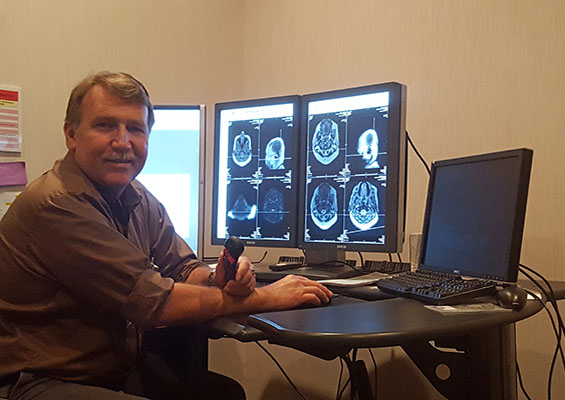
It was a regular, busy day at one of the many sites operated by the New Hannover Regional Medical Center (NHRMC) in Wilmington, N.C. Radiologists were performing MRIs, CT scans and X-rays on patients. The department's machines are networked to transmit images where they need to go – so when a computer goes down, it's an emergency. That day, one radiologist's PC kept crashing. Tony Phillips, information services support at NHRMC, received a call. He needed to fix the computer – and he had an hour to do it.
The computers at NHRMC's radiology department need to facilitate many different tasks at once. Dictation applications and patient charts must share the screen with programs that create, store and transmit massive image files. No application is expendable, but sometimes they conflict, so processing power is at a premium.
Phillips arrived on the scene and went through a mental troubleshooting checklist, noting where he could tweak and upgrade the machine to optimize performance. At each step, he thought back to his CompTIA training.
Thinking CompTIA A+, he replaced a beat-up CAT 5 cable with a new one, opened the computer's case and re-seated the RAM, and explored Windows Event Viewer to find and resolve software conflicts. Turning to CompTIA Network+, he contacted his network engineer to confirm there was no packet loss and set the network adapter to auto-negotiate. Inside an hour, the computer was fixed – and it has stayed fixed.
"I got through with that machine, and it has not crashed since – and I pulled every bit of that from my CompTIA certification training," Phillips said.
In his eight years at NHRMC, Phillips has used the knowledge from his CompTIA certifications almost every day. But knowledge isn't the only value he's gotten from his certifications.
Thanks to CompTIA certifications, Phillips was able to reinvent his life – beginning a new career in his 40s and, eventually, moving to the small beach side town he fell in love with to pursue it.
CompTIA and the Drive to Succeed
That's when I decided to move here, and that's when I decided that I needed CompTIA. I invested in two more certifications to get me here.
Through the 1980s, Phillips worked in the textile and tool-and-die industries. But by the late 1990s he needed a new career – and a formal education to get one. Thanks to the Workforce Investment Act, Phillips enrolled at Nashville State Community College (NSCC) in Cookeville, Tenn. and, seeing that computers were the way forward, pursued a technical degree.
Phillips thrived in the new academic environment. And when the opportunity came to take CompTIA A+ as his final exam, he jumped at it. The campus director drove Phillips and another student 100 miles to the nearest testing center, and a week later, Phillips had both a diploma and a certification.
With a two-year degree and a CompTIA A+ certification, Phillips landed a job at family-owned refrigeration manufacturer W.A. Brown. He helped his manager get the IT operations working like a well-oiled machine.
The year was 2004. Phillips was in his 40s. His IT career had just begun, and there was still plenty of room for him to move forward.
A Sense of Community
Most people visit resort towns like Kure Beach, N.C. for the beach. But as Phillips began visiting the tiny town regularly to unwind, he discovered something it had to offer beyond sun and sand – community.
On a Christmastime visit, Phillips noticed a small stage and bleachers set up in the center of town. The community was hosting a Christmas play. He realized that he was the only tourist in attendance. It was all locals involved in the festivities. Seeing people come together, he wanted to be a part of it. But to compete in the resort town's job market, he knew he needed more credentials.
"That's when I decided to move here, and that's when I decided that I needed CompTIA," Phillips said. "I invested in two more certifications to get me here."
After a regimen of self-study that lasted most of 2009, Phillips earned his CompTIA Network+ and CompTIA Security+. That plus his five years of experience got him the job at NHRMC.
At Home and Still Growing with CompTIA
The radiology department's IT operations and workflows were running smoothly a week after Phillips' one-hour optimization. He had a moment to enjoy his coffee while undertaking critical – but less hectic – tasks, like checking for inconsistencies between databases. But at any time, a page could come in from one of the 100-some users in the department – and any of those users could be in a big hurry.
Phillips doesn't mind the demands. He's doing what he loves in a place he's happy to be. Whether he's riding his classic 1962 Schwinn bicycle, taking pictures or presiding as vice president of the Historical Preservation Society, he’s a part of the Kure Beach community.
For Phillips, being a fixture in the cozy resort town doesn't mean retirement. He is still building IT skills and not slowing down. As he considers getting CompTIA Server+, he can't speak highly enough about the many benefits of CompTIA certifications.
“The benefit of getting certified is the education you get preparing for the certification,” Phillips said. “It’s the respect you get from the people who realize you went above and beyond what you had to just to do your job. It shows that you are interested in what you do to the point that you want to do more and set goals for yourself and reach those goals.”
Thinking about a career in IT? See which certification is right for you.
Matthew Stern is a freelance writer based in Chicago who covers information technology, retail and various other topics and industries.

